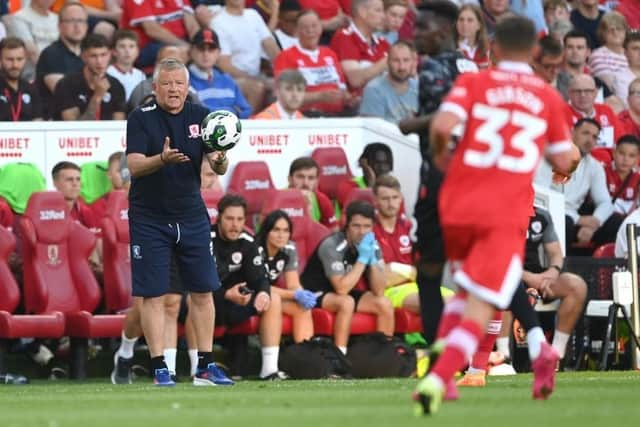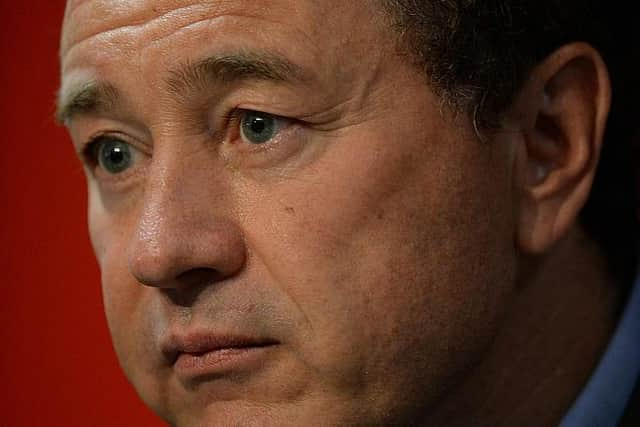Comment: After Chris Wilder's sacking, Middlesbrough's next appointment needs to be a coach, not a manager
But once those on the terraces and in the dressing room thought his head might have been turned by interest in the vacant Bunley job, things never recovered.
The last few weeks have felt like an uneasy stand-off, with the end feeling inevitable but no one – not Wilder, not chairman Steve Gibson and not Bournemouth, the latest Premier League club linked to him – prepared to make the first move.
Advertisement
Hide AdAdvertisement
Hide AdEventually, with the Teessiders in the Championship relegation zone after just shot of a quarter of the season, it was Gibson who blinked first, and told the Sheffielder to clear his desk.


The concern from day one was that Wilder was not going to fit snugly into the continental-style structure Boro were trying to build off the field, just as his predecessor Neil Warnock had seemed slightly at odds with it, with two strata of signings – one his short-term recruits, another "club project" signings.
But when Wilder started dragging Boro from mid-table mediocrity into genuine play-off contention, we convinced ourselves it could work.
The impatient Wilder takes an Oliver Twist approach to recruitment and eventually it strained relationships both at Boro and his previous club, Sheffield United, where an already successful career gained extra gloss from a ninth-placed Premier League finish.
Advertisement
Hide AdAdvertisement
Hide AdWith eight matches played whilst the transfer window was open, Wilder was not shy in publicly asking for more, leaving squad numbers vacant to highlight what he wanted. Three new strikers – Marcus Forss, Matthew Hoppe and Rodrigo Muniz – were signed yet the feeling was it was not enough. Duncan Watmore’s miss-and-miss performance at home to Rotherham highlighted how the recruitment drive had failed to address the club’s biggest failing, the lack of a clinical finisher.


Alex Mowatt and Massimo Luongo added quality to the midfield but Bournemouth whisking James Tavernier away late in the window left that department of the pitch the pitch lacking dynamism.
Paddy McNair's standards dipped and wing-backs Isaiah Jones and Ryan Giles were benched for the final game. Manchester City loanee Zack Steffen made good saves and bad mistakes.
But it was the post-Burnley chemistry that just did not feel right, with four wins in 18 after the distraction of Sean Dyche's sacking.
Advertisement
Hide AdAdvertisement
Hide AdOne wonder's what effect Wilder's honesty about the shortcomings of his squad had on those doing the job at the time. Chuba Akpom responded brilliantly to being told he had no place in the manager's plans, but others did not.
Wilder is too good a manager not to succeed somewhere else, the refreshing football he and Alan Knill preach hard to play but even harder to combat when done properly. He will find, though, the clubs offering him the degree of control he craves are getting fewer and fewer.
His successor must be on board with that.
With a director of football in Kieran Scott, Boro need a coach, not a manager next. Until January at least, the squad is assembled, and the only job is to get the best out of them.Former Barnsley player Rob Green, one of the new breed who had success at Forest Green but did not have time – surprise, surprise – at Watford to transfer that to the second tier, was quickly made the bookmaker's favourite for the job.
Second in the betting, Dyche feels more like a manager, though he has always been more adaptable than he was given credit for. Mark Bonner, who came close to replacing Paul Warne at Rotherham United is another option. Former midfielder Gary O'Neil, doing such a good job as Bournemouth caretaker, could be an interesting option but the club is in limbo waiting to be taken over.
Whoever it is, though, will need to work with Scott and his team, not against it. Creative tensions have not paid off with the last two incumbents.